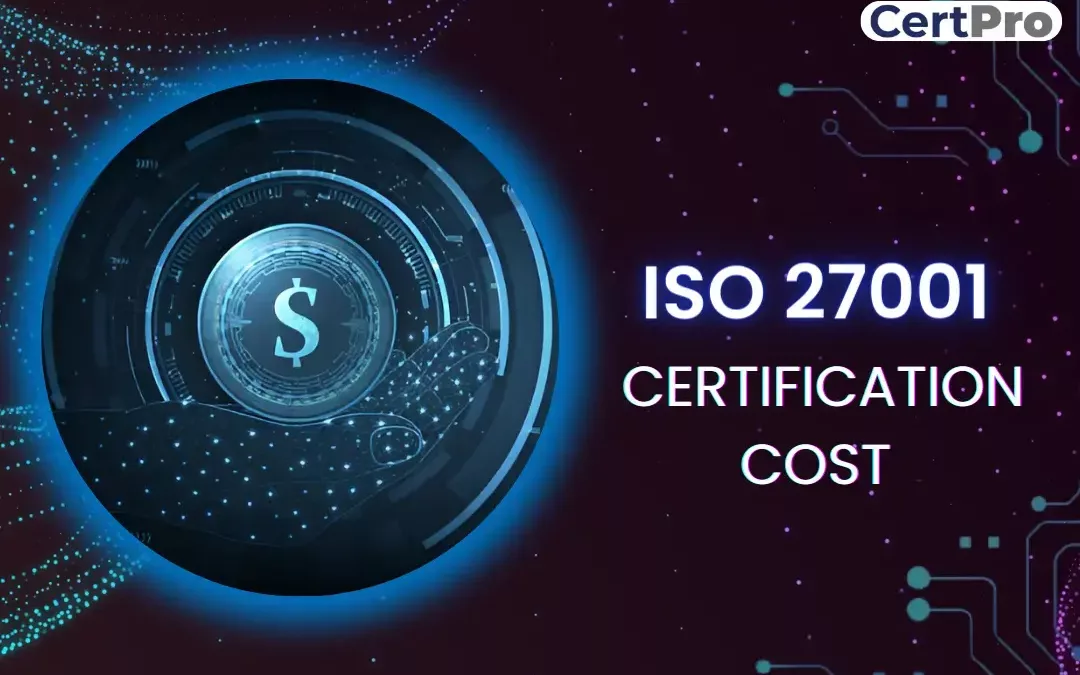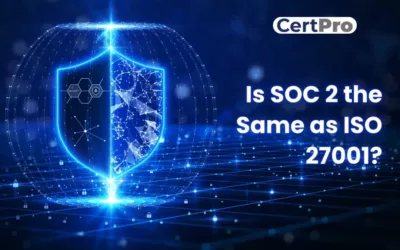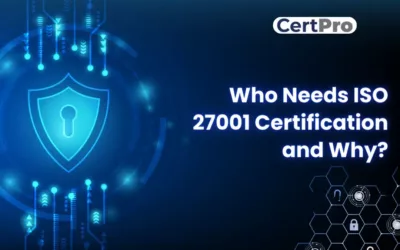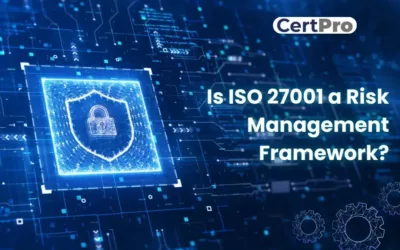Information is one of the most precious assets for any organization in the modern digital age. However, with the increase in cyber risks and data breaches, safeguarding that data has become paramount. This is where ISO 27001, the global standard for information security management systems (ISMS), comes in. It offers a framework for businesses to set up, implement, maintain, and continuously improve their information security management.
The cost of ISO 27001 certification may vary depending on the organization’s size, the complexity of the information security management system (ISMS), and the certification body selected, which can affect the price of ISO 27001 certification.
What is ISO 27001?
ISO 27001 accreditation is an internationally recognized benchmark for information security management. It provides a structure for setting up, implementing, maintaining, and continuously improving an information security management system (ISMS) within an organization. The standard is intended to help businesses of all sizes and types safeguard their sensitive information assets from online assaults, unauthorized access, and other security lapses. However, the cost associated with obtaining ISO 27001 certification is a major concern for businesses seeking the certification.
Why is it important?
Compliance with ISO 27001 enables organizations to demonstrate robust security procedures, which can strengthen customer relationships and provide a competitive edge. With ISO 27001 accreditation, organizations can explore new business opportunities with confidence, knowing that their claims are validated. Certification can be used to bid for new contracts, demonstrate to prospective clients that security is taken seriously, and differentiate from the competition.
Related Links
ISO 27001 Certification
ISO 20000 Certification
ISO 22301 Certification
ISO 21001 Certification
ISO 41001 Certification
ISO 50001 Certification
ISO 29001 Certification
ISO 14001 Certification
ISO 45001 Certification
ISO 22000 Certification
ISO 17025 Certification
ISO 13485 Certification
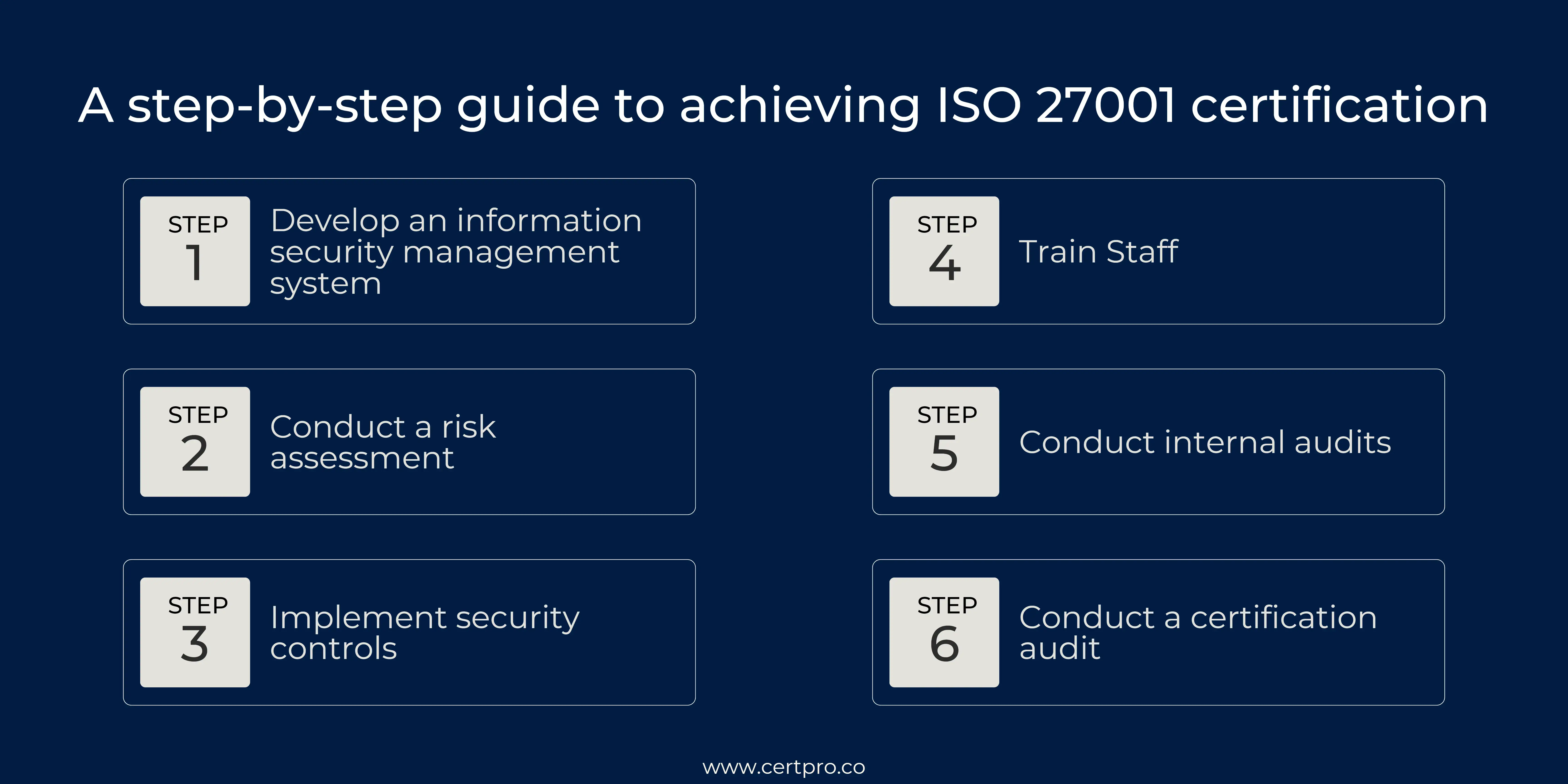
A step-by-step guide to achieving ISO 27001 certification
Achieving ISO 27001 certification is a comprehensive process that requires significant planning, preparation, and implementation. The following is a step-by-step guide on how to achieve ISO 27001 certification:
- Develop an information security management system (ISMS): The first step towards achieving ISO 27001 certification is to develop an information security management system (ISMS). The ISMS should be designed to manage and protect the confidentiality, integrity, and availability of an organization’s information assets. The ISMS should be based on the ISO 27001 standard and should include policies, procedures, and controls that address the specific risks and threats to the organization’s information assets.
- Conduct a risk assessment: The next step is to conduct a comprehensive risk assessment to identify potential threats and vulnerabilities to the organization’s information assets. To determine the likelihood and potential impact of each threat, a team of qualified professionals should conduct a risk assessment. The risk assessment should then be used to develop a risk management plan that addresses the identified risks.
- Implement security controls: Based on the results of the risk assessment, the organization should implement security controls to address the identified risks. The security controls should be designed to prevent, detect, and respond to security incidents. The security controls should be based on industry best practices and tailored to the specific risks and threats facing the organization.
- Train Staff: All staff members should be trained on the organization’s ISMS, security policies, and procedures. The training should be designed to ensure that all staff members understand their roles and responsibilities in protecting the organization’s information assets. The training should also include regular security awareness training to ensure that staff members are aware of current security threats and best practices.
- Conduct internal audits: The organization should conduct regular internal audits to assess the effectiveness of its ISMS and security controls. Professionals with the necessary training and experience should conduct the internal audits in order to find any security posture flaws or opportunities for improvement.
- Conduct a certification audit: The final step towards achieving ISO 27001 certification is to undergo a certification audit. An accredited certification body should carry out the certification audit and confirm that the organization’s ISMS and security controls adhere to the requirements of the ISO 27001 standard. If the organization passes the certification audit, it will receive ISO 27001 certification.
Achieving ISO 27001 certification requires significant planning, preparation, and implementation. By following the steps outlined above, organizations can develop an effective ISMS and security posture that protects their information assets and achieves ISO 27001 certification.
How much does ISO 27001 certification cost?
Depending on the needs of the firm, ISO 27001 certification might cost anywhere from a few thousand to tens of thousands of dollars. However, the price of certification should be seen as an investment in the information security of the company and can result in long-term cost savings and increased productivity.
Examining the Expenses of ISO 27001 Certification at Various Phases
Each stage of the multi-part ISO 27001 procedure has its own set of fees. We’ll break down each stage and consider the associated costs. Given that the size of the firm has a significant impact on certification expenses, we’ll make things easier by using a tiny start-up with 50 people as our example. Show prospective customers that you take security seriously and make yourself stand out from the competition.
Beginning stage ($3,000–$8,000): At this stage, you must define the scope of your information security management system (ISMS), determine where sensitive data is kept, perform a risk analysis, and then put the rules and controls in place necessary to reduce those risks.
You have to prepare a Statement of Applicability (SoA), which sums up the risk treatment plan, describes how your organization will react to any hazards identified in your risk assessment, justifies any controls you opted not to install, and details the controls you did implement.
At last, you have to train your team to support the new ISMS and conduct an internal audit to know that they are ready for an external audit to review your documentation.
Four Options for ISO 27001 Certification
- Doing it with the help of an internal team: Setting up an internal team for ISO 27001 to oversee the certification process from the beginning until the external audit Even if it’s not impossible, realize that DIY projects typically take up a lot of your employees’ time and can make it take months to prepare for an audit. While this appears to be a cost-free choice, there is a significant opportunity cost associated with using key workers’ productive work hours to pursue audit readiness. Forget about the delays they cause in other business-critical processes and product launches.
- Contacting an external consultant: Using an external consultant is the most common suggestion we get from anyone. They already have enough knowledge and skills to help you in the process of getting ISO 27001 certified. In terms of assisting with policy formation, defining the scope of your ISMS, drafting the SOA, risk assessments, and risk treatment plans, to name a few, they carry out the majority of the burdensome tasks.
- By using tools like GRC: A strategy for managing an organization’s overall governance, enterprise risk management, and regulatory compliance is known as governance, risk, and compliance (GRC). They are semi-automated and offer templates for the numerous documents required for your ISO 27001 journey. They also provide an outline of the risks you face and the auditing requirements needed to ensure compliance. However, the majority of GRC tools don’t take edge circumstances into consideration, demand manual intervention, are frequently created for larger organizations, and don’t perfectly fit into the SaaS/startup ecosystem.
- Via CertPro: CertPro is one of the best auditing and consulting firms. It is a multinational firm of auditors and consultants that offers turnkey projects for all of your compliance auditing, consulting, and certification requirements. By implementing industry best practices, adhering to established timeframes and budgets, and properly utilizing all resources, projects are successfully delivered.
Stage 1 and 2 Audits ($2,000–$6,000): The audit-certification procedure is divided into two phases. The documentation audit is stage 1, and the certification audit is stage 2. For a small start-up, hiring an auditor for these stages will cost between $2,000 and $6,000.
Surveillance and Recertification Audits ($2,000–$4,000): After completing stage 1 and 2 audits, your company will be ISO 27001 certified, but to maintain that certification, you have to undergo a surveillance audit in years 1 and 2 and also a recertification audit in the 3rd year. The surveillance audits typically cost between $2,000 and $4,000 because they are less thorough than the initial documentation and certification audits. Since the recertification audit is just as thorough as the initial certification audit, you ought to expect a similar price.
To assist with the certification process, companies can opt to work with consulting firms like CertPro, a multinational firm of auditors and consultants that offers turnkey projects for all compliance auditing, consulting, and certification needs. CertPro implements industry best practices, adheres to established timeframes and budgets, and properly utilizes all resources to ensure successful project delivery.

About the Author
ANUPAM SAHA
Anupam Saha, an accomplished Audit Team Leader, possesses expertise in implementing and managing standards across diverse domains. Serving as an ISO 27001 Lead Auditor, Anupam spearheads the establishment and optimization of robust information security frameworks.
FAQ
How may an organization lower the cost of obtaining ISO 27001 certification?
An organization might lower the cost of getting ISO 27001 certification by:
- Clearly stating the ISMS’s remit
- Implementing an effective risk assessment and management process
- Careful selection of a certifying body
- Create and maintain efficient documentation.
- Internal audits on a regular basis
- Ensuring that all workers are aware of the value of information security and their part in sustaining it. ensuring that the ISMS is properly integrated into the organization’s culture
How long does it take to become certified with ISO 27001?
The total amount of time that is required for an organization to get ISO 27001 certification will depend on an extensive list of parameters, including the scale of the company and level of complexity, the level of preparation, and the certifying body chosen. On average, accreditation takes between six and twelve months to complete.
What elements impact the expense of obtaining an ISO 27001 certification?
The following things could impact how much ISO 27001 certification might cost:
- Size and complexity associated with the business
- Locations and business units count.
- Elements of the ISMS
- required level of documentation
- Needs for knowledge and understanding
- Duration and frequency of audits
- Selected certification bodies
Is it beneficial to make an investment in ISO 27001 certification?
It is, indeed. An ISO 27001 authorization demonstrates to your clients and potential clients that you handle cybersecurity seriously and have the procedures and systems established to protect confidential data.
How long is ISO 27001 certification valid?
The three-year certification period for ISO 27001 begins on the day of certification. In order to prove that it is maintaining and enhancing its information security management system (ISMS) in accordance with the ISO 27001 standard, the certified organization must submit to annual surveillance audits.
The organization must go through a re-certification audit to extend its certification for another three years after the completion of the three-year certification cycle. The organization’s ISMS, including its policies, procedures, and controls, will be thoroughly evaluated as part of this re-certification audit to make sure it continues to adhere to the standards of the ISO 27001 standard.
IS SOC 2 THE SAME AS ISO 27001?
In today's digital landscape, ensuring the safeguarding of client data is paramount for businesses. Adhering to recognized compliance standards is vital to meeting this demand. ISO 27001 vs. SOC 2 represent two prominent benchmarks in the realm of data security with...
WHO NEEDS ISO 27001 CERTIFICATION AND WHY?
The esteemed ISO 27001 security framework is designed to evaluate the effectiveness of an organization's Information Security Management System (ISMS) in safeguarding its data. Obtaining ISO 27001 certification is a practical way for a corporation to demonstrate its...
IS ISO 27001 RISK ASSESSMENT VITAL FOR SECURITY MEASURES?
The ISO 27001 standard provides a framework for information security, highlighting the importance of a thorough risk assessment procedure. Organizations use the methodical and complex ISO 27001 risk assessment process to identify and assess information security...

